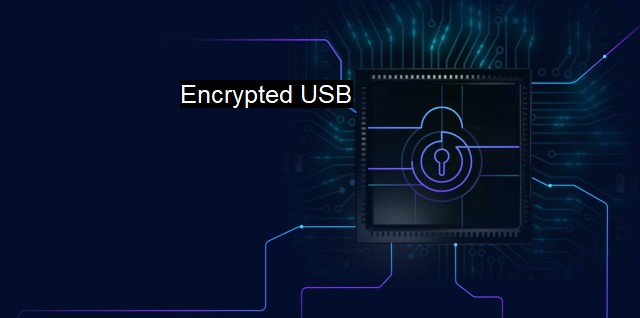What is Encrypted USB?
Enhancing Data Privacy and Protection: The Benefits of Encrypted USB for Cybersecurity
An encrypted USB is a security-focused portable USB drive that helps to protect sensitive information. This technology employs advanced encryption methods, often using either symmetric or asymmetric cryptographic algorithms, to secure data stored on them. In other words, they convert information stored within them into complex codes, which protects the contents from being accessed or manipulated without authorization.Regular USB drives have been ubiquitous for well over a decade, favored for their portability and convenience. these simple storage devices have also seen their fair share of criticism concerning security breaches and exploits. Confidential business data, personal photos, health records, academic research—all are often transported, stored, and shared on basic USB drives that provide no inherent level of security or protection. This is where the concept of encrypted USB drives comes into the picture.
An encrypted USB drive sets itself apart by offering advanced levels of security in an elementary package. The fundamental idea is to leverage cryptographic technology to scramble information into complicated code, unreadable by any individual or software without the correct algorithm key. This is done via software that translates the information stored on the drive into obfuscated data using the key. an unlocked drive's contents behave similarly to a non-encrypted drive, adding usability to security.
Even robust encryption algorithms alone would be insufficient—because anyone who stole or found a misplaced encrypted USB could use brute force software to eventually, over a period of time, guess the correct decryption key. Therefore, there's a need for strong user verification practices such as strong, unique passwords and biometric identification, coupled with automatic system protection strategies such as timeouts and automatic re-encryption of at-rest data.
Also notable is the importance of hardware-based encryption relative to software encryption. Encrypted USB drives usually employ the former, and for good reason: Because hardware-based encryption is incorporated directly into the device's design, it is less exposed to the vulnerabilities of software encryption that occur during transmission or where the encryption key is stored in easily accessible memory.
To understand the scale and extent of USB-associated threats, one must acknowledge how widespread USB usage is, making them a primary vector for transmitting malware or viruses. Antivirus tools are incredibly useful in handling these threats. the most potent antivirus protection will always fall short against a motivated and capable bad actor. By adding an encrypted USB into the mix, with the encryption key known only by the user themselves, even the most effective, state-of-the-art virus will just end up delving into an impenetrable vault of unintelligible data.
An encrypted USB drive, at its core, serves as a paradigm showcasing how storing and transporting sensitive data should look in today's increasingly interconnected world where not everything should be openly accessible. Its marriage of convenience and security ensures that valuable data, either personal or professional, is adequately protected, regardless of where it is or who it is with.
The simple USB drive has evolved into its competent sibling – the encrypted USB, merging accessibility and protection in one tool. While not utterly infallible, encrypted USBs add an extra level of data integrity and confidentiality, ensuring that even if lost or stolen, the contents remain safe, sealing off one more avenue for potential cyber attacks. As cybersecurity threats grow more advanced and persistent, and as data becomes increasingly valuable, encrypted USBs set a new standard for protecting portable data.

Encrypted USB FAQs
What is an encrypted USB drive?
An encrypted USB drive is a USB flash drive that has been designed to protect the data stored on it by encrypting it before storing it, thereby making the data unreadable unless the user has the encryption key or password.Why do I need to use an encrypted USB drive?
Using an encrypted USB drive is important in cybersecurity as it prevents unauthorized access to data stored on the drive. If the drive is lost or stolen, sensitive data remains safe and confidential as it cannot be accessed without proper authentication.How do I encrypt a USB drive?
Encrypting a USB drive can typically be done through software that comes with the USB drive or by using third-party encryption software. Many operating systems also offer built-in encryption functionalities. Once encrypted, the user will need to enter a password or key to access the data stored on the drive.What should I consider when choosing an encrypted USB drive?
When choosing an encrypted USB drive, you should consider the level of encryption provided, the storage capacity, speed, and compatibility with your devices. It's also important to consider the reputation of the manufacturer and the reliability of the encryption software used. Additionally, make sure the encrypted USB drive is compatible with any antivirus software you have installed to help prevent malware or virus infections.| | A | | | B | | | C | | | D | | | E | | | F | | | G | | | H | | | I | | | J | | | K | | | L | | | M | |
| | N | | | O | | | P | | | Q | | | R | | | S | | | T | | | U | | | V | | | W | | | X | | | Y | | | Z | |
| | 1 | | | 2 | | | 3 | | | 4 | | | 7 | | | 8 | | |||||||